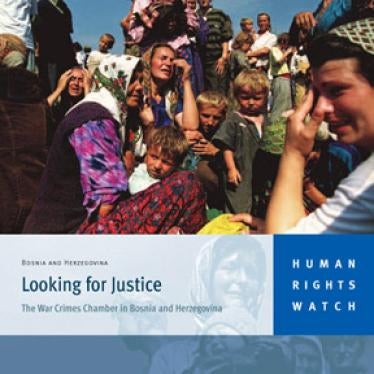High Representative Valentin Inzko
Your Excellency,
We are writing to you to express serious concern regarding the impending expiration of the mandates of international judges and prosecutors in the War Crimes Chamber (WCC) of the State Court of Bosnia and Herzegovina. We commend your office's previously demonstrated commitment to ensure the effective processing of cases involving war crimes, crimes against humanity and genocide in pushing, together with the International Criminal Tribunal for the former Yugoslavia (ICTY), for the creation of the WCC beginning in 2003.
At that time, international involvement was considered necessary because of grave deficiencies in the justice system in the aftermath of the Bosnian war, including a shortage of personnel, a lack of training in addressing serious criminal cases, and concerns about the bias of national judges and prosecutors. Since beginning operations in early 2005, the chamber can boast significant achievements, including the processing of more than 40 cases and the enhanced capacity of national staff. The presence of international staff in the chamber has also helped insulate the institution from political interference and strengthen its perceived and actual independence.
But much work remains to be done. There are literally thousands of war crimes cases emanating from the conflict, some involving multiple defendants, which have not yet been addressed. The National Strategy for Processing War Crimes Cases, adopted by the Council of Ministers in late 2008, reflects an effort to devise a systematic approach to the issue of resolving the large number of outstanding cases. The successful implementation of this strategy demands even more focused efforts by all staff in the chamber. The Peace Implementation Council Steering Board last month identified the need to "speed up the implementation" of this strategy.[1]
Of course, we appreciate the importance of ensuring national ownership over the WCC and, in fact, have praised efforts to ensure the institution is transitioned to national authorities over the longer term.[2] At the same time, however, the lack of a responsible plan to handover ultimate responsibility for the processing of war crimes cases risks undercutting the chamber's work and its overall effectiveness.
For instance, we understand that a number of international prosecutors within the Special Department for War Crimes have already left the office due to uncertainty surrounding the extension of their mandates, leaving posts vacant. This reduction of crucial staff power jeopardizes the successful implementation of the above noted war crimes strategy. Of those international prosecutors and support staff remaining, there does not appear to be an effective strategy to transfer their responsibilities to national staff for cases in trial, as well as those that are in the investigative stage. At the very least, this will likely result in creating lengthy delays as national prosecutors and support staff become familiar with these cases. There is also the risk that cases may be compromised or abandoned given the lack of sufficient staff power and expertise to handle them effectively. Similar concerns have been raised by the ICTY Prosecutor in his most recent report to the United Nations Security Council.[3]
Your Excellency, the failure to resolve the issue of the mandates of international judges and prosecutors will have detrimental consequences that extend beyond the chamber. We note that the Peace Implementation Council Steering Board has expressed "serious concern" that the failure of the Bosnian authorities to address the matter "would have a negative effect on the entire judicial system of Bosnia, contradict [Bosnia's] international obligations, and inhibit the UN Security Council's completion strategy for ICTY."[4]
At a minimum, there should be a transition period to ensure that cases involving international judges and prosecutors that have come to trial are completed with the same personnel prior to their departure, as well as a sufficient transition period for the handover of cases that have yet to come to trial.
Time is running out. As you know, on December 14, the mandates of international judges and prosecutors at the WCC will expire. It remains unclear whether the Bosnian authorities will advance a solution by that date that will ensure that the chamber's important work thus far is not compromised and that it is equipped to effectively implement the National Strategy for Processing War Crimes Cases.
We therefore strongly urge you to continue in your efforts to broker agreement with the Bosnian authorities to that effect. If they fail to agree by December 14, we recommend that you to consider other alternatives, including using your extraordinary Bonn powers, to extend the mandates of international judges and prosecutors in the WCC to the extent necessary to achieve these important goals. After enduring unspeakable suffering, the countless victims of war crimes, crimes against humanity and genocide in Bosnia deserve justice.
Please do not hesitate to contact us should you wish to discuss this further.
Sincerely,
Richard Dicker
Director, International Justice Program
Human Rights Watch
Benjamin Ward
Associate Director, Europe and Central Asia Division
Human Rights Watch
[1] Communique of the Steering Board of the Peace Implementation Council, November 19, 2009 [hereinafter "PIC Communique"].
[2] Human Rights Watch, Looking for Justice: The War Crimes Chamber in Bosnia and Herzegovina, vol.18, no. 1(D), February 2006, https://www.hrw.org/en/reports/2006/02/07/looking-justice; Human Rights Watch, Narrowing the Impunity Gap: Trials Before Bosnia War Crimes Chamber, vol. 19, no. 1(D), February 2007, https://www.hrw.org/en/node/11032/section/1.
[3] Report of Serge Brammertz, Prosecutor of the International Tribunal for the Former Yugoslavia, provided to the Security Council under paragraph 6 of Security Council resolution 1534 (2004), S/2009/589, November 12, 2009, http://www.icty.org/x/file/About/Reports%20and%20Publications/Completion... (accessed on December 7, 2009), para. 46.
[4] PIC Communique.







